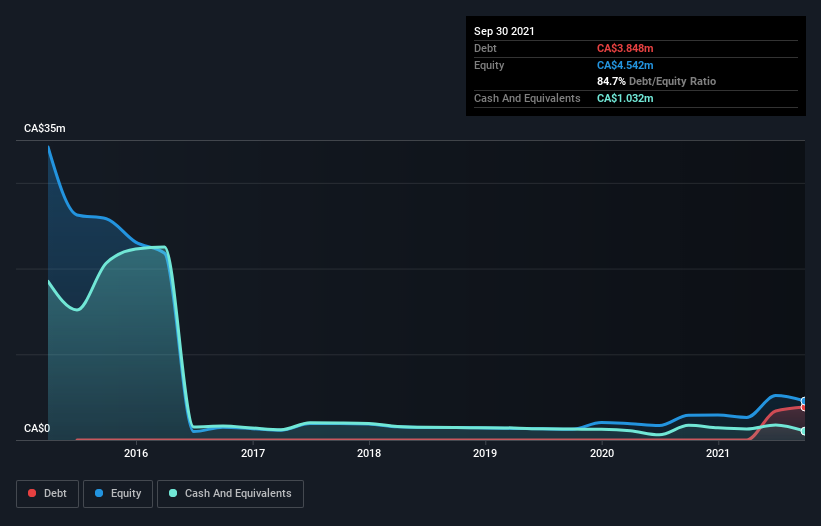David Iben put it well when he said, 'Volatility is not a risk we care about. What we care about is avoiding the permanent loss of capital.' When we think about how risky a company is, we always like to look at its use of debt, since debt overload can lead to ruin. We can see that ROK Resources Inc. (CVE:ROK) does use debt in its business. But the more important question is: how much risk is that debt creating?
What Risk Does Debt Bring?
Debt is a tool to help businesses grow, but if a business is incapable of paying off its lenders, then it exists at their mercy. In the worst case scenario, a company can go bankrupt if it cannot pay its creditors. However, a more usual (but still expensive) situation is where a company must dilute shareholders at a cheap share price simply to get debt under control. By replacing dilution, though, debt can be an extremely good tool for businesses that need capital to invest in growth at high rates of return. The first step when considering a company's debt levels is to consider its cash and debt together.
See our latest analysis for ROK Resources
How Much Debt Does ROK Resources Carry?
The image below, which you can click on for greater detail, shows that at September 2021 ROK Resources had debt of CA$3.85m, up from none in one year. However, it also had CA$1.03m in cash, and so its net debt is CA$2.82m.

How Healthy Is ROK Resources' Balance Sheet?
Zooming in on the latest balance sheet data, we can see that ROK Resources had liabilities of CA$1.47m due within 12 months and liabilities of CA$6.75m due beyond that. On the other hand, it had cash of CA$1.03m and CA$653.0k worth of receivables due within a year. So it has liabilities totalling CA$6.54m more than its cash and near-term receivables, combined.
While this might seem like a lot, it is not so bad since ROK Resources has a market capitalization of CA$14.9m, and so it could probably strengthen its balance sheet by raising capital if it needed to. But it's clear that we should definitely closely examine whether it can manage its debt without dilution. The balance sheet is clearly the area to focus on when you are analysing debt. But you can't view debt in total isolation; since ROK Resources will need earnings to service that debt. So when considering debt, it's definitely worth looking at the earnings trend. Click here for an interactive snapshot.
In the last year ROK Resources wasn't profitable at an EBIT level, but managed to grow its revenue by 883%, to CA$2.0m. That's virtually the hole-in-one of revenue growth!
Caveat Emptor
While we can certainly appreciate ROK Resources's revenue growth, its earnings before interest and tax (EBIT) loss is not ideal. Indeed, it lost a very considerable CA$1.9m at the EBIT level. Considering that alongside the liabilities mentioned above does not give us much confidence that company should be using so much debt. So we think its balance sheet is a little strained, though not beyond repair. However, it doesn't help that it burned through CA$7.1m of cash over the last year. So suffice it to say we consider the stock very risky. The balance sheet is clearly the area to focus on when you are analysing debt. But ultimately, every company can contain risks that exist outside of the balance sheet. To that end, you should learn about the 5 warning signs we've spotted with ROK Resources (including 1 which is a bit concerning) .
If, after all that, you're more interested in a fast growing company with a rock-solid balance sheet, then check out our list of net cash growth stocks without delay.
New: AI Stock Screener & Alerts
Our new AI Stock Screener scans the market every day to uncover opportunities.
• Dividend Powerhouses (3%+ Yield)
• Undervalued Small Caps with Insider Buying
• High growth Tech and AI Companies
Or build your own from over 50 metrics.
Have feedback on this article? Concerned about the content? Get in touch with us directly. Alternatively, email editorial-team (at) simplywallst.com.
This article by Simply Wall St is general in nature. We provide commentary based on historical data and analyst forecasts only using an unbiased methodology and our articles are not intended to be financial advice. It does not constitute a recommendation to buy or sell any stock, and does not take account of your objectives, or your financial situation. We aim to bring you long-term focused analysis driven by fundamental data. Note that our analysis may not factor in the latest price-sensitive company announcements or qualitative material. Simply Wall St has no position in any stocks mentioned.
About TSXV:ROK
Excellent balance sheet and fair value.
Market Insights
Community Narratives



